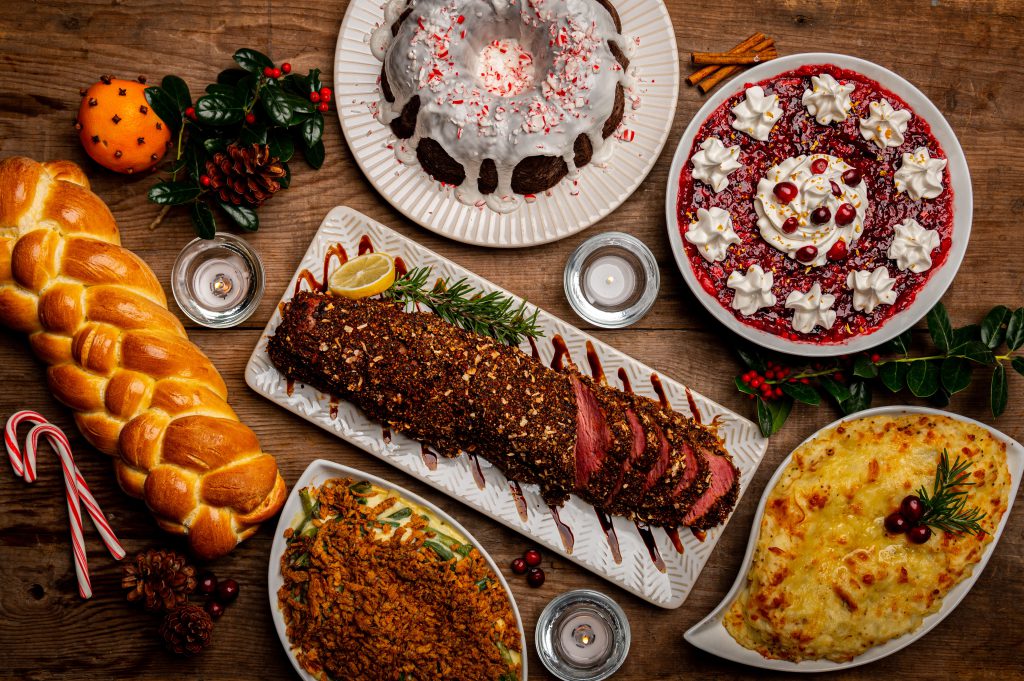
We understand that if you’re being mindful about what you eat with your colostomy or ileostomy it can feel tricky to navigate festive occasions. We wanted to help empower you to balance celebrating and eating well this time of year. We’ve included festive foods for Hanukkah, Christmas Day, Boxing Day, Kwanzaa, Hogmanay, First Footing, Burns Night, and Chinese New Year. We’ve highlighted which traditional recipes should be fine to eat and have included suggested recipe tweaks and alternative dishes.
If you’d like us to mention other foods, or if you feel we haven’t gotten something quite right, please get in touch to share with us. Alongside this blog, we have plenty of advice in our Ostomates Kitchen with free downloadable guides on nutrition, hydration and recipes.
Our Top Tips
- Many recipes that have tougher to digest foods which may be tolerated in small amounts
- You may want to pick only one or two of these foods to have in the day so as not overwhelm your gut
- Everyone’s gut tolerance is different so eat what you feel comfortable with
- Chew your food well and take your time eating
- If you’re sensitive to onion or garlic, you might like to substitute them for a little asafoetida powder instead
- If you have alcoholic drinks, aim to have no more than two across the whole day
- Aim to choose lower sugar drinks or those with minimal sweeteners
- Alternate between alcoholic or very sweet drinks with a hydrating option e.g., water flavoured with fresh fruit slices and herbs
Hanukkah: 10th-18th of December
Brisket – if serving with onions have up to one or two tablespoons.
Kugel – depending on how you tolerate onions, have up to one or two tablespoons.
Latkes – as above.
Challah roll – enjoy as is.
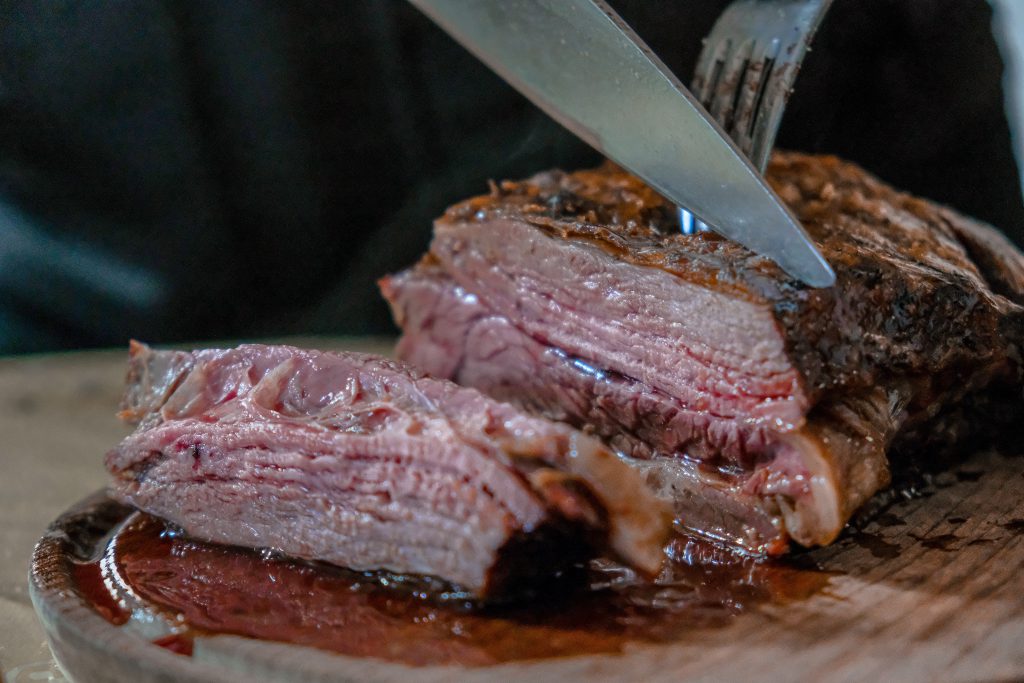
Brussels sprouts – they may be too tough to digest (especially with an ileostomy) so have one or two and chew them very well.
Other vegetable side dishes – choose roasted, boiled or mashed root vegetables (peel before cooking). Most flavourings shouldn’t cause symptoms e.g. cinnamon, nutmeg, orange zest, cranberry, and tahini. Be mindful of your personal tolerance to onion and garlic.
Babka cake – if it contains dried fruit, it can be hard to digest, so you could have a small portion and chew it very well. You could try making it without dried fruit or pick out the dried fruit before eating.
Sufganiyot – make with smooth jam.
Christmas Day: 25th of December
Traditional Christmas Festive Foods
Roasted meats – cook so they’re very soft and tender.
Haggis – you might tolerate one or two tablespoons if you chew it well. You could blend the onions and oats till they’re smooth before mixing with the meat.
Nut roast – you may tolerate one or two thin slices if you chew well (even with an ileostomy), but it’s best to blend the nuts before baking. You might prefer another plant-based main dish.
Quorn roast – enjoy as is with your favourite festive flavourings.
Tofu roast – we’ve created a delicious and easy to digest Maple-glazed Tofu recipe for you to enjoy.
Roast potatoes – enjoy as is.
Yorkshire Pudding – enjoy as is.
Roasted root vegetables e.g., parsnips and carrots, neeps and tatties: peel them, cook them until soft and enjoy with your favourite flavourings such as honey and spices.
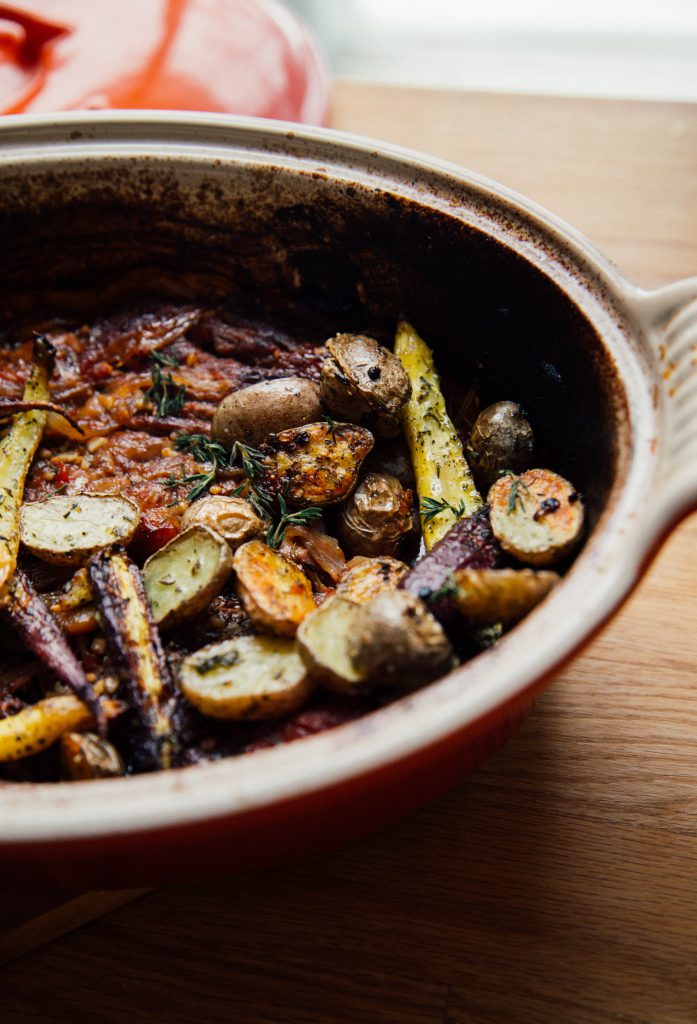
Brussels sprouts – as mentioned in the Hanukkah section above. You might prefer to try par-boiled and roasted broccoli florets with bacon, or our delicious Broccoli Gratin recipe.
Red cabbage dishes – similar to Brussels sprouts, have up to one or two tablespoons and chew well. It can give a red tinge to your stoma output, but this is from the pigments in the cabbage.
Pigs in blankets – aim to choose those without gristle and chew well.
Stuffing – a regular portion of one or two stuffing balls, or one to two tablespoons is unlikely to cause symptoms.
Bread sauce – is unlikely to cause symptoms in portions of one or two tablespoons. Blend the sauce so it’s smooth.
Cranberry sauce – choose smooth options.
Traditional Christmas Desserts
Christmas Pudding and Christmas Cake – the dried fruit is typically hard to digest (for any bowel-stoma), so you could have a small portion and chew it very well. You might prefer to choose a different dessert e.g., Yule log or trifle.
Clootie Dumpling – as above.
Bread and butter pudding – you might prefer to pick out the dried fruit or you could try our bread and butter pudding recipe.
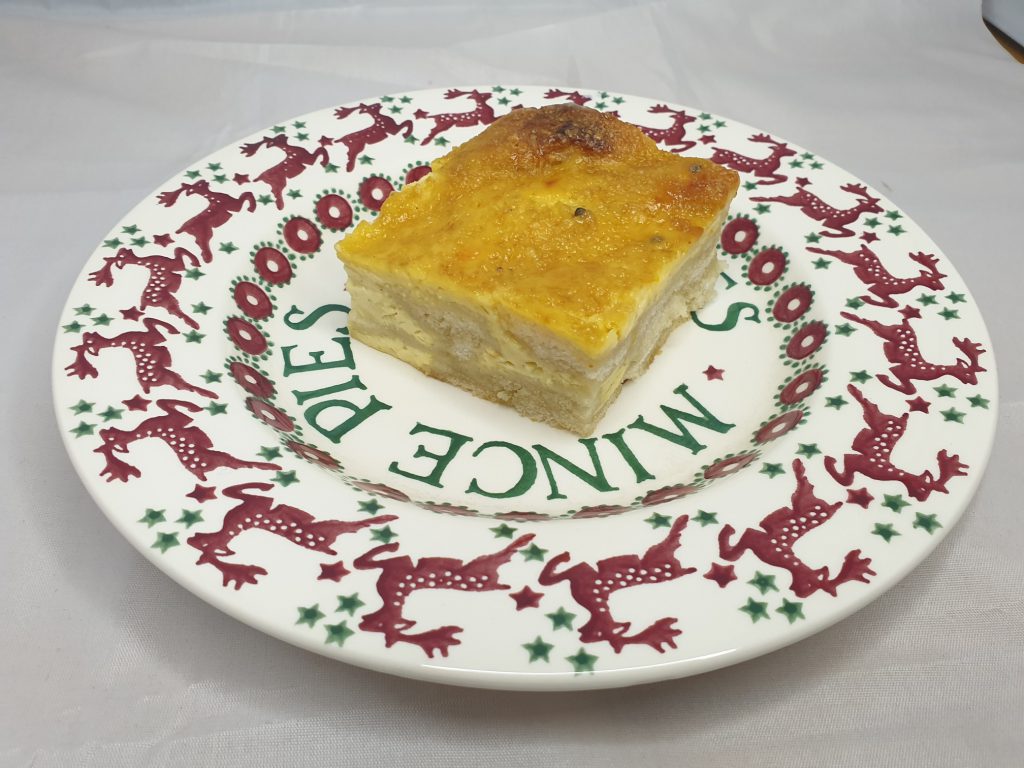
Mince Pies – you might tolerate one small pie if you chew it very well (even with an ileostomy). There are also some recipes online that don’t include dried fruit. Type into your internet search bar, mince pies with no dried fruit.
Cheeseboard – opt for crackers without seeds and choose cheeses without dried fruits.
Traditional Christmas snacks
Nuts – unfortunately these are likely to cause symptoms, especially with an ileostomy, although if you’ve tried them before and tolerated them you may like a small portion e.g., one tablespoon, well chewed. You might enjoy nut butter on banana or apple slices (peeled), Bamba Peanut Corn Snacks, and nut butter and oat-based energy balls (blend the oats before making these).
Crisps – enjoy as is.
Pastries – choose those without dried fruit.
Chocolate – be mindful of having too much as it can cause a stomach upset.
Other cuisines and Christmas
Spiced meats – enjoy as is but be mindful of too much onion and garlic.
Samosas and Pakoras – they can be full of onions, spinach and other vegetables that may be tougher to digest. You might like to have one or two and chew them very well, especially with an ileostomy. If possible, you could blend all the fibrous ingredients until smooth before mixing together and cooking.
Gulab Jamun – if the recipe contains nuts, have one or two sweets and chew very well (especially with an ileostomy). You might like to make some without nuts.
Chin Chin and Puff Puff – enjoy as is.
Boxing Day: 26th of December
Turkey and cranberry sauce sandwiches – you might tolerate white bread better than wholemeal or seeded. Choose smooth cranberry sauce.
Turkey soup – be mindful of onions and celery. You could strain these out before serving your portion.
Bubble and Squeak, Rumbledethumps, and Colcannon: due to the brussels sprouts, and/or cabbage and kale, you might like to have up to two tablespoons and chew very well (especially with an ileostomy). You could blend the vegetables until smooth before cooking. You might like to swap those vegetables for leftover root vegetables instead.
Kwanzaa: 26th of December – 1st of January
Jollof rice – depending on which vegetables you use, choose easier to digest options and cook them well e.g., bell peppers, carrot, and peeled aubergine. You can parboil plantain before frying so it’s easier to digest. Green beans, peas, and celery can be hard to digest even when well cooked. You might like to have one or two tablespoons of these vegetables in total, chewing very well (especially with an ileostomy).
Spiced meats or fish – ensure they’re very soft before eating, be mindful of bones.
Jambalaya – similar to the Jollof rice notes. You could blend the tomatoes until smooth (sifting out pips) before cooking.
Gumbo – similar to the Jollof rice notes.
Coleslaw – as the vegetables are raw these may not be well tolerated if you have a colostomy or ileostomy. If you’d like to try it, have one or two tablespoons at most and chew very well.
Collard or Spring Greens – unfortunately these are very difficult to digest if you have a bowel stoma. It’s best to choose a different vegetable side dish.
Potato salad – as per the coleslaw notes.
Fried okra – this can be difficult to digest so have two tablespoons at most, and chew very well (especially with an ileostomy).
Fufu – enjoy as is.
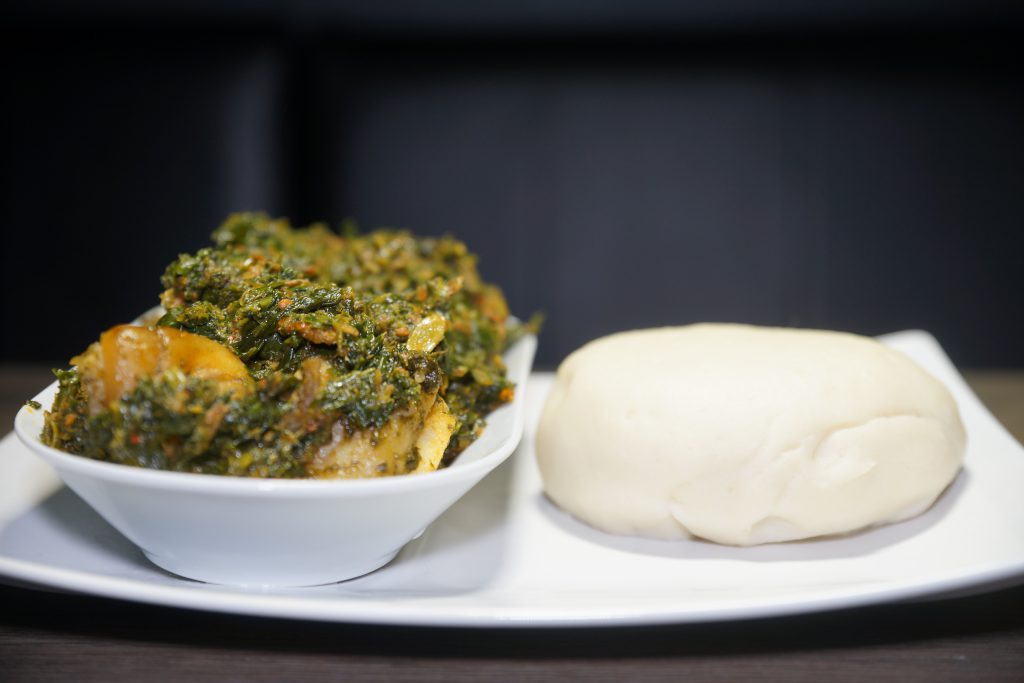
Cornbread – enjoy as is.
Flatbread – enjoy as is.
Sweet potato pie – enjoy as is.
Fruits – choose easier to digest options such as mango, banana, melon, papaya, rather than more fibrous fruits like pineapple.
Hogmanay & First Footing: 31st of December
Haggis – you might tolerate one or two tablespoons if you chew it well. You could blend the onions and oats till they’re smooth before mixing with the meat.
Cock-a-leekie soup – if you have a colostomy you might tolerate up to two tablespoons of leeks if they’re very soft. If you have an ileostomy, or you’d prefer to anyway, you can blend the leeks into the soup. Note that this can increase the smell of your output.
Clootie Dumpling – the dried fruit is typically hard to digest (for any bowel-stoma), so you could have a small portion and chew it very well. You might prefer to choose a different dessert e.g., Yule log or trifle.
Black Bun – similar to the Christmas Pudding notes in the Christmas section.
Shortbread – if it has dried fruit, see the Mince Pie notes. Otherwise, enjoy as is.
Cranachan – you might like to have a little of the raspberries and oats, chewing very well (especially with an ileostomy). You could use strawberries instead which might be tolerated better. You could swap the oats for crushed shortbread or another biscuit.
Burns Night: 25th of January
Haggis – you might tolerate one or two tablespoons if you chew it well. You could blend the onions and oats till they’re smooth before mixing with the meat.
Clootie Dumpling – the dried fruit is typically hard to digest (for any bowel-stoma), so you could have a small portion and chew it very well. You might prefer to choose a different dessert e.g., Yule log or trifle.
Chinese New Year: 25th of January

Shredded duck – chew very well to make the crispy skin easier to digest, enjoy with smooth sauces. If serving with cucumber, peel before slicing to serve. You might tolerate a few slices of spring onion and you’ll likely find the green parts easier to digest.
Steamed fish – cook so it’s very soft.
Longevity noodles – there are so many variations of this recipe, but we recommend the following: skip using mushrooms or green beans, but you can blanch other vegetables before adding into the noodles e.g., carrot or bell pepper slices, bamboo shoots, white radish, a few broccoli florets, or the green parts of Chinese cabbage. Chew everything very well (especially with an ileostomy).
Mooncake – if they’re made with dried fruit, nuts and seeds you might like to have half of one cake and chew it very well. If you have an ileostomy, or you’d prefer to anyway, you could blend all the ingredients before cooking. Serve with smooth sauces.
Black Jelly and other jellies – enjoy as is.
We hope that you feel reassured about choosing festive foods and reducing the risk of blockages and symptoms like cramps, high stoma outputs, stoma bag ballooning, and increased smells. Whatever you’re celebrating over the next couple of months, we wish you and your loved ones all the best.
Laura Coster is a Registered Dietitian who is passionate about helping people feel confident in managing their health and find joy through what they eat. She has worked for the NHS advising people at various stages of their stoma journey and continues to help promote gut health to all.

